She found a pack of Kleenex in her purse and wiped the sweat from her face, leaving dark smudges of mascara on the tissue, then unsuccessfully searched her drawers for a rubber band to pull back her long hair. She was expecting Mrs. Reinard, the mother of a student who had been doing poorly in her class, at any moment, and was surprised when the woman arrived thirty minutes late. She was dressed entirely in black, her dark hair coiled into a bun, her lips and fingernails painted red, a gold pin in the shape of a cicada fastened to the lapel of her suit jacket. She paused in the doorway before entering the classroom, framed by the fluorescent light of the hall, holding her purse against her stomach.
Juliana suddenly felt insecure about her French. She had been fluent for years, but retained an American accent.
She expected Mrs. Reinard’s speech to be confident and throaty, a voice cured by cigarettes and good wine, but when she smiled and gestured toward the chair across from her desk, she strained to hear the whispered apology. As Mrs. Reinard took her seat, Juliana noticed a tiny run in the woman’s stockings.
“I’ve asked you here to talk about your son,” she said, folding her hands on top of the desk. “And his progress in my class.”
“I gather he hasn’t made much.”
Juliana was aware some parents thought English shouldn’t be offered in French schools, that it was an inferior language. As a result, several of her students didn’t take her class seriously, submitted assignments late and didn’t study for exams. She told Mrs. Reinard all this, then said what concerned her about Fredrick was not his performance in the classroom — he was, in fact, an average student — but the troubling behavior he’d started to display.
Mrs. Reinard adjusted her gold pin. “What kind of behavior?”
“Last week, a boy said something that upset Fredrick and he tried to stab him with his pencil.” She didn’t tell Mrs. Reinard that she hadn’t been in the room when the incident occurred. One of the office assistants had called her into the hallway, and she’d told the children to review a chapter in their textbooks before rising slowly and walking outside, feeling light-headed, wondering if this had something to do with her husband, Cole, although it turned out the assistant just wanted to tell Juliana the afternoon teacher’s meeting had been cancelled. When she returned to the classroom, Fredrick was sulking in a corner, the other boy crying and gripping the pointed end of a broken pencil. None of the other students would tell her exactly what had happened and she’d reported it as a minor scuffle. “Surely you received a call from the headmaster?”
Mrs. Reinard did not respond.
“I’ve also been finding these drawings underneath his desk.” She opened a drawer and dropped a thin stack of paper in front of Mrs. Reinard. When she remained silent, Juliana added that she’d heard Fredrick had also attempted to smother the science class’s pet frog.
Mrs. Reinard held up a particularly gruesome drawing: a man with red hair, his thin neck twisted as though it might be broken, plumes of blood shooting from his open mouth. The figure had no eyes or nose and appeared to be floating. It had the smudged, asymmetrical look of a Basquiat — but more lurid and frightening. “Fredrick drew this?”
Juliana nodded.
“The man is his father. I can tell by the hair.” She pressed the sheet of paper face down against the table. “He left us in February,” she continued. “Not a word. Just gone.”
The first thing that entered Juliana’s mind was, of course, her own husband, who’d disappeared in the fall, but she didn’t mention that to Mrs. Reinard, nor did she say how Fredrick often looked at her during their lessons or when students were filing out of the classroom — a dead-eyed stare that made her stomach tighten, his green eyes unfeeling as stone.
“His father is fortunate to be on his own.” Mrs. Reinard brushed lint off her jacket sleeve. “I really have no idea what we will do now.”
Juliana suggested Fredrick start seeing the school counselor once a week, but Mrs. Reinard only shrugged and said she would look into it.
“Please do,” Juliana replied. “It really might help.”
“What about you?” she asked. “Do you have a husband with you in the city?”
“Not presently.” Juliana glanced at the pale circle on her finger, a reminder of where her wedding ring had once been, a plain band with three rectangular diamonds. She had loved it at first, enjoyed the weight on her hand and the glint of the stones, but by their five-year anniversary, it had started giving her blisters and the diamonds had taken on a cloudy glare. The mark had started to fade during the spring. By mid-summer, she predicted it would be gone completely.
“How long do you plan to keep at this?” Mrs. Reinard flung her hand into the open space of the classroom.
“Perhaps through the fall,” Juliana replied, even though she had not yet decided whether she would continue teaching English in the St. Germain district or return to the States or go someplace else entirely.
Mrs. Reinard rose and smoothed her skirt. “Paris is miserable in the summer.”
“I’m not looking forward to it.”
“You could travel.”
“I could.”
“Take my advice.” She leaned across the desk and touched Juliana’s wrist. Her skin smelled of gardenia. “And go to the sea.”

Juliana was unable to find a seat on the metro — not surprising for a Friday evening. She stood in the center of the car, squished between two balding men and a woman cradling groceries. She peered into the paper bag and caught the scent of basil. Sparks of silver light flickered in the dark tunnel and she heard a whistling noise, as though they were burrowing deep into a cave.
Cole had never adjusted to Paris. He found the city crowded and dirty and, after being flashed by a man in a black trench coat on the metro, added perversity to his long list of complaints about the French. They had moved to Europe in August, when Cole — an economist— accepted a two-year offer from the Bank of France and Juliana registered with a teaching abroad program. They had come from Boston, where she taught literature at a private school, and in some ways the new locale wasn’t so different. She liked the city, the gardens, the cafés, the bridges, the craft stalls that lined the Seine. After the first few months, she even started dreaming in French: she was a hostess in a patisserie in one, a guide at the Louvre in another. But Paris also raised her husband’s bothersome qualities to unbearable levels. He was irritable and narrow in his refusal to adopt French customs. She was always asking colleagues for restaurant recommendations and taking him places she thought he might like, but he was never satisfied. She fell into the routine of polishing off a bottle of wine every night just to quiet her nerves.
Still, the most startling changes in her husband didn’t occur until the fall, when riots bloomed in a Paris neighborhood and spread all the way to the countryside. The violence was triggered by the deaths of two teenagers in the suburb of Clichy-sous-Bois. The boys, thinking they were being chased by police, dove over a wall and hid in a power substation, where they were electrocuted, their deaths unleashing waves of anger at the French authorities. In the months that followed, fleets of vehicles were burned, schools and public buildings destroyed, thousands arrested, power stations attacked. Before it was over, the rioters had spread all the way to Toulouse, Lille, Strasbourg, and Lyon.
It was a concern to her, of course. They had only been abroad for three months when unrest unfurled into chaos. Juliana checked the news each morning to stay informed and then went about her business: teaching, grading papers, buying baguettes and slabs of butter at the corner market, finishing the Balzac novel she’d been struggling through all summer, going to weekend art exhibitions and concerts.
Читать дальше













